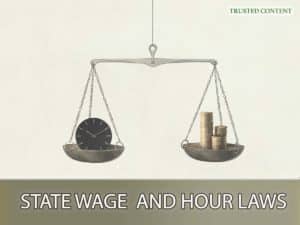Wage and Hour Law | #1 California Employment Lawyer | Representing Workers
Our Featured Case Result - $1 MILLION
At Napolin Law, we're passionate about fighting for the rights of workers and ensuring they're treated fairly under wage and hour laws. One such case that demonstrates our commitment involved a group of injured workers at a large, well-known restaurant chain. While we can't disclose the names of the parties involved due to a confidentiality agreement, we can share the details of this inspiring success story.
A group of employees at a popular restaurant chain found themselves in a difficult situation. They had sustained workplace injuries, which limited their ability to perform their usual duties. However, the restaurant management had been shortchanging their work hours, causing them to be underpaid. Despite the employees raising concerns about the issue, the management refused to take action and rectify the situation.
Frustrated and feeling powerless, the employees turned to Napolin Law for help. Our legal team quickly recognized that the workers were being unfairly treated, and we believed they deserved justice. We took on their case, determined to hold the restaurant chain accountable for their actions.
Our team conducted a thorough investigation, gathering evidence to support the workers' claims. We discovered that not only had the restaurant chain shortchanged the employees' hours, but they had also failed to pay proper overtime wages and provide adequate meal and rest breaks.
Armed with this evidence, our legal team entered into negotiations with the restaurant chain's legal representatives. We presented our findings and made it clear that we were prepared to take the case to court if necessary.
The restaurant chain, facing the prospect of a lengthy and costly legal battle, decided to settle the case. They agreed to pay a million dollars in compensation to the group of injured workers. This significant settlement provided the employees with the financial compensation they deserved for the injustices they had suffered.
Understanding Wage and Hour Laws: Your Rights as an Employee

Wage and Hour Law - #1 California Employment Lawyer - Representing Workers
Are you curious about your rights as an employee when it comes to wages and work hours? This blog post is here to help you understand the ins and outs of wage and hour laws. We'll cover the basics, talk about some specific laws, and give you some examples to help make things clear. So, let's get started!
What are Wage and Hour Laws? (Heading) Wage and hour laws are rules that determine how much you get paid and how many hours you can work. They're in place to protect employees from being taken advantage of by employers. These laws exist at both the federal and state levels, so you'll want to be familiar with the ones that apply to you.
The Fair Labor Standards Act (FLSA)
One major law you should know about is the Fair Labor Standards Act (FLSA). This federal law sets the minimum wage, overtime pay, and child labor standards for most workers in the United States. Let's take a closer look at some of its key components.
Minimum Wage
The federal minimum wage is set by the FLSA, and it's currently $7.25 per hour. However, many states have higher minimum wages. For example, California's minimum wage is $15.50 per hour (2023). If both federal and state minimum wages apply to you, you're entitled to the higher of the two.
Overtime Pay
Overtime pay is another important aspect of the FLSA. Employees who work more than 40 hours in a week are entitled to overtime pay at a rate of one and a half times their regular pay rate. For example, if you usually make $10 per hour and you work 45 hours in a week, you'd be paid $15 for each of those 5 extra hours.
Exempt vs. Non-exempt Employees
Not all employees are covered by the FLSA's overtime rules. Some workers are considered "exempt," which means they don't qualify for overtime pay. Exempt employees typically include certain executive, administrative, professional, and outside sales employees. Non-exempt employees, on the other hand, are covered by the FLSA and are eligible for overtime pay.
Child Labor
The FLSA also includes child labor provisions to protect the safety and well-being of young workers. These rules set age limits and restrict the types of jobs and hours that minors can work. For example, 14- and 15-year-olds can work in certain jobs, but their hours are limited and they're not allowed to work during school hours.
State Wage and Hour Laws

State Wage and Hours Laws California
In addition to the FLSA, each state has its own wage and hour laws. These laws can provide additional protections for workers, such as higher minimum wages, more generous overtime rules, or specific break and meal periods. It's important to be familiar with the laws in your state, as they can differ significantly from federal regulations.
Breaks and Meal Periods
Many states require employers to provide rest and meal breaks for employees. For example, California requires a 10-minute paid rest break for every four hours worked, and a 30-minute unpaid meal break for every five hours worked. Be sure to check your state's laws for specific requirements.
Independent Contractors vs. Employees
It's important to understand the difference between an independent contractor and an employee because wage and hour laws generally apply only to employees. Independent contractors are self-employed individuals who have more control over their work and are not covered by most wage and hour laws. However, sometimes employers misclassify workers as independent contractors to avoid following these laws. If you think you've been misclassified, you may want to consult with an employment attorney to protect your rights.
Record-Keeping Requirements
Employers are required to keep accurate records of employees' hours worked and wages paid. This helps ensure that workers are paid fairly and accurately. If you suspect that your employer is not keeping proper records or paying you correctly, it's important to bring this to their attention and seek legal advice if necessary.
Tips for Protecting Your Rights

Tips for Protecting Your Rights California
Now that we've covered the basics of wage and hour laws, let's talk about some steps you can take to ensure your rights are protected.
Know the Laws
Being familiar with the wage and hour laws that apply to you is essential for protecting your rights. This includes knowing the federal FLSA regulations as well as your state's laws. Don't hesitate to do some research and ask questions if you're unsure about anything.
Keep Track of Your Hours
Keeping a record of your own hours worked can help you ensure that you're being paid correctly. This includes tracking any overtime hours, breaks, and meal periods. Having a personal record can be helpful if you ever need to dispute your pay or work hours with your employer.
Address Issues with Your Employer
If you believe that your employer is violating wage and hour laws, it's important to bring this to their attention. They may not be aware of the issue, or they may need a reminder to follow the rules. Be respectful and professional in your communication, and keep a record of your conversations.
Seek Legal Advice
If your employer does not address your concerns, or if you think you've been misclassified as an independent contractor, consider consulting with an employment attorney. They can help you understand your rights and guide you through the process of filing a claim if necessary.
Understanding Wage and Hour Laws: Your Rights as an Employee
Understanding wage and hour laws is crucial for protecting your rights as an employee. By being familiar with the FLSA and your state's laws, keeping track of your work hours, and addressing any concerns with your employer, you can help ensure that you're being treated fairly. And remember, if you ever need legal advice or assistance, don't hesitate to consult with an employment attorney.
Common Wage and Hour Law Violations

Common Wage and Hour Law Violations California
As an employee, it's important to be aware of common wage and hour law violations that can occur in the workplace. By knowing what to look out for, you can better protect your rights and ensure you're being treated fairly.
- Unpaid Overtime: One common violation is the failure to pay overtime wages to eligible employees. This can happen when employers misclassify workers as exempt or fail to properly track and pay for overtime hours. Be sure to keep a personal record of your work hours and compare it with your pay stubs to ensure you're being paid correctly.
- Minimum Wage Violations: Another common issue is employers not paying the correct minimum wage. As we mentioned earlier, you're entitled to the higher of the federal or state minimum wage. Check your pay stubs to make sure your employer is paying you the correct amount.
- Off-the-Clock Work: Sometimes, employers may ask employees to perform work duties without clocking in, which can lead to unpaid wages. This could include tasks like setting up before your shift starts or cleaning up after your shift ends. Be sure to report all hours worked, even if they fall outside of your scheduled shift.
- Missed Breaks and Meal Periods: As we discussed earlier, many states require employers to provide breaks and meal periods for their employees. If your employer is not providing these breaks or is requiring you to work through them, they may be violating wage and hour laws.
- Improper Deductions: Employers may sometimes make improper deductions from an employee's pay, such as charging for uniforms or taking out excessive amounts for breakages or cash register shortages. Be sure to review your pay stubs carefully and question any deductions that don't seem correct.
- Misclassification of Workers: As mentioned earlier, the misclassification of employees as independent contractors is a common issue. This can lead to workers being denied the protections and benefits they're entitled to under wage and hour laws. If you believe you've been misclassified, consult with an employment attorney for advice.
By being aware of these common wage and hour law violations, you can better protect your rights and ensure that you're being treated fairly by your employer. If you notice any of these issues in your workplace, don't hesitate to address them with your employer or seek legal advice if necessary.
Understanding wage and hour laws and being aware of potential violations are essential for protecting your rights as an employee. Always be proactive in tracking your work hours, staying informed about the laws that apply to you, and addressing any concerns with your employer. And if necessary, don't hesitate to seek legal advice to ensure you're treated fairly and in compliance with the law.
Experience the Napolin Law Difference: Protecting Workers' Rights
Are you or someone you know facing wage and hour law violations, workplace injuries, or unfair treatment at work? Look no further than Napolin Law Firm, your dedicated legal partner in the fight for justice. Our team of experienced attorneys is here to help you navigate the complex world of employment law and secure the compensation you deserve.

Office Hours
Chat or Call 866-627-6546

Schedule Your Free Consultation
Submit Your Information

